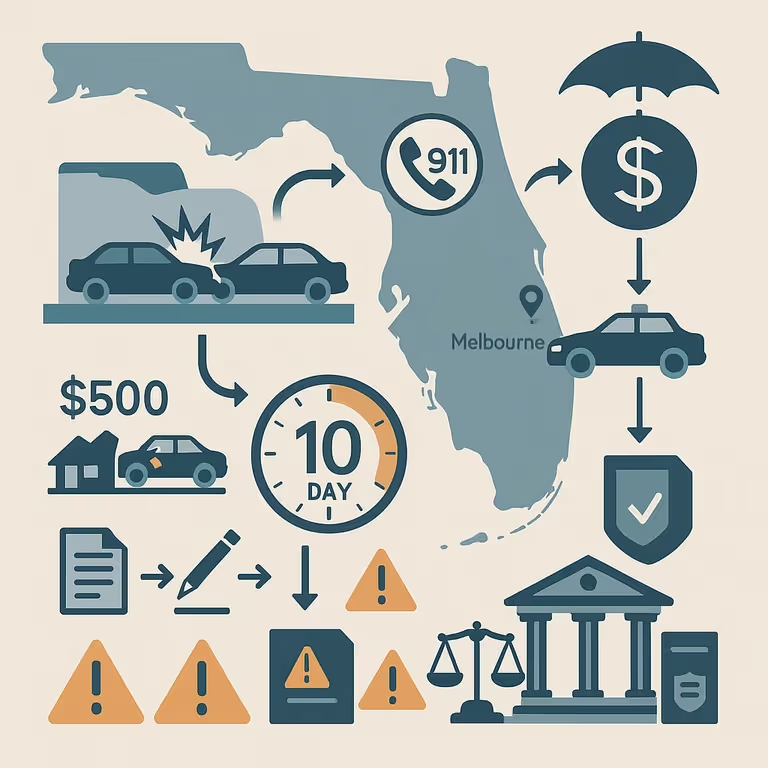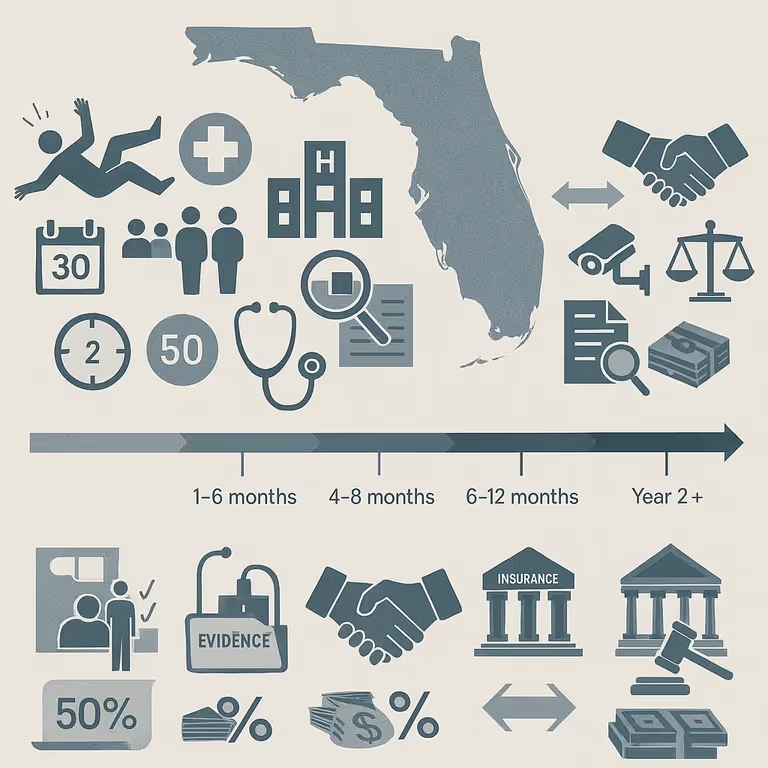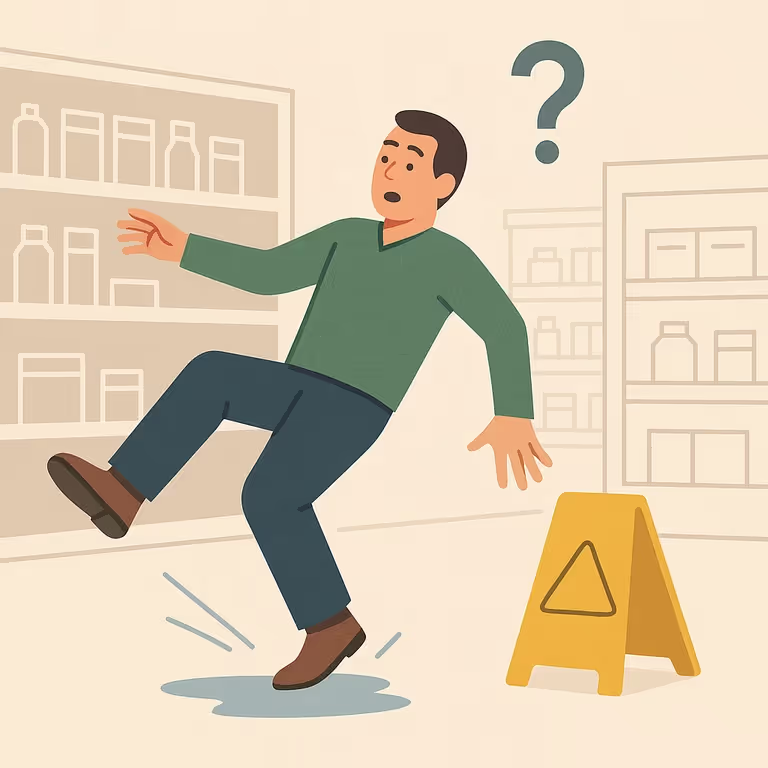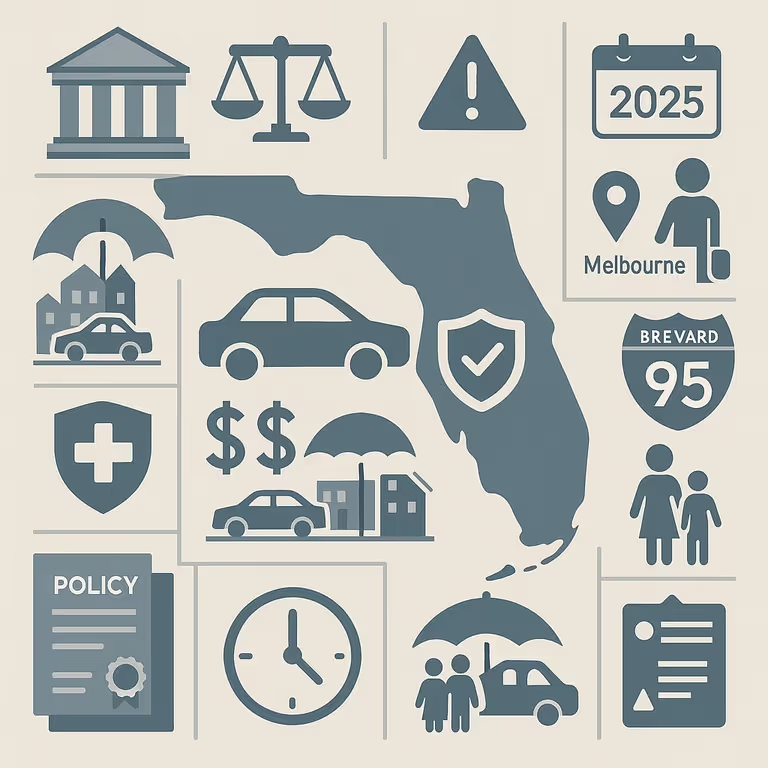When Is a Written Boating Accident Report Required in Florida?
Learn when Florida law requires boating accident reports. Understand the 48-hour injury rule vs 10-day property damage rule to protect your rights.
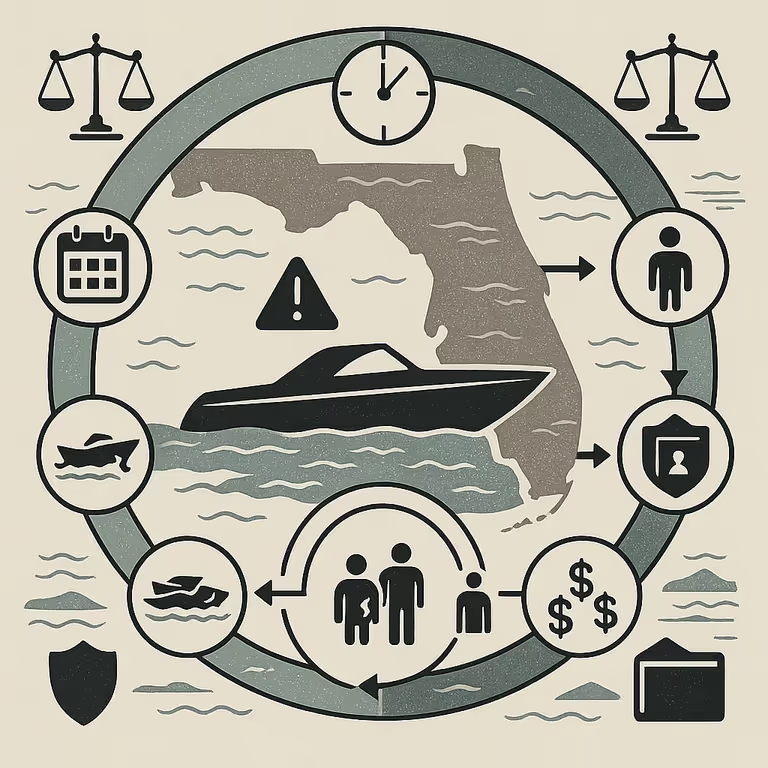
- Florida has two reporting deadlines: 48 hours for injuries/death, 10 days for property damage over $2,000.
- "Medical treatment beyond first aid" means any professional medical care, triggering the 48-hour requirement.
- Property damage threshold includes all damage from all parties involved in the accident combined.
Worried About Your Injury Case? We'll Review It - Free!


Florida law requires written boating accident reports under specific circumstances governed by Florida Statute 327.301. Unlike some states with universal reporting requirements, Florida creates two distinct reporting timelines based on the severity of the accident, not just one blanket rule that applies to every situation.
Understanding which timeline applies to your situation is crucial for staying compliant with state law and protecting your legal interests. The Florida Fish and Wildlife Conservation Commission (FWC) oversees these reporting requirements and enforcement.
Understanding Florida's Two Reporting Timelines
The key to understanding Florida's boating accident reporting requirements is recognizing that there are two separate deadlines based on what happened in your accident:
The 48-Hour Rule: This urgent deadline applies when someone is killed, injured badly enough to need medical care beyond basic first aid, or disappears under circumstances suggesting they might be hurt or dead.
The 10-Day Rule: This longer timeline applies to accidents that cause property damage totaling $2,000 or more but don't involve any reportable injuries.
These aren't overlapping requirements. You follow one or the other based on your specific accident circumstances. However, if your accident involves both injuries and significant property damage, the 48-hour rule takes precedence because injury accidents are considered more serious under Florida law.
The distinction matters because the penalties for missing these deadlines and the urgency of your legal obligations are different. Property damage accidents give you more time to gather information and file accurately, while injury accidents require immediate action to comply with state law.

Understanding the 48-Hour Injury Reporting Deadline
When a boating accident results in death, injury requiring medical treatment beyond first aid, or disappearance under circumstances indicating possible death or injury, Florida law requires you to file a written accident report within 48 hours. This is the most stringent reporting requirement under state law.
What Triggers the 48-Hour Deadline
The phrase "medical treatment beyond first aid" is key to understanding when this urgent deadline applies. If someone needs to see a doctor, nurse, paramedic, or receive any professional medical care beyond basic bandaging or cleaning a wound, the 48-hour rule kicks in. This includes situations where someone goes to an emergency room, urgent care clinic, or even just needs stitches from a medical professional.
"Disappearance" means someone went missing in circumstances that suggest they might be injured or dead. This could happen if someone falls overboard and cannot be found, or if someone was in the accident area but is now missing and potentially harmed.
Filing Requirements and Process
Boat operators involved in 48-hour reportable accidents must obtain and complete the official accident report form, which can be secured through local police departments or FWC resources. The person operating the vessel at the time of the accident is typically responsible for filing, though passengers may also need to file reports in certain circumstances.
It's important to understand that federal reporting requirements may also apply in addition to Florida state reporting, particularly for accidents in federal waters or involving vessels from multiple states. This means you might need to file reports with both state and federal authorities.
Personal injury attorneys understand that proper accident reporting serves as a crucial foundation for protecting legal rights, especially when serious injuries occur. The information you provide in these initial reports can significantly impact any subsequent legal proceedings or insurance claims.

Property Damage Reports: The 10-Day Timeline
When your boating accident involves only property damage totaling $2,000 or more, Florida law requires you to file a written accident report within 10 days. This longer timeline reflects the less urgent nature of property-only accidents while still ensuring that significant damage incidents are properly documented.
Understanding the $2,000 Threshold
The $2,000 property damage threshold includes damage to all boats, docks, piers, or other property involved in the accident, not just damage to your own vessel. If your boat sustained $1,500 in damage and the other boat had $800 in damage, you've crossed the $2,000 threshold and must file a report.
Property damage estimates should include the cost to repair damaged items and the replacement value for anything that was completely destroyed. Don't forget to account for damage to equipment, electronics, or personal property that was in the boats during the accident.
Important Timeline Distinction
Remember that if there are any injuries requiring medical attention beyond basic first aid, the 48-hour rule applies instead of the 10-day rule, regardless of how much property damage occurred. The injury reporting requirement always takes precedence over property damage reporting timelines.
Consequences of Non-Compliance
Failure to file required reports within the specified timeframes can result in penalties under Florida law. While specific penalty amounts vary, the consequences of non-reporting can affect your legal standing and may complicate insurance claims.
Recent legislative activity suggests that Florida lawmakers are paying increased attention to boating safety enforcement. In 2025, Miami legislators proposed boosting penalties for boating accidents with severe injuries to third-degree felonies, indicating that the state continues to take boating accident reporting and safety seriously.

Melbourne Boaters: Local Waterway Considerations
East Central Florida, including Brevard County where Melbourne is located, experiences significant boating activity due to its unique coastal location and extensive waterway access. Melbourne area boaters navigate both inland waterways and Atlantic coastal waters, which can affect accident scenarios and reporting requirements in different ways.
Local Boating Environment and Risks
The Melbourne area's diverse boating environment includes the Indian River Lagoon system, Atlantic Ocean access, and numerous inland waterways. This variety means local boaters might encounter different accident scenarios – from shallow water groundings in the lagoon system to rough weather incidents in coastal waters.
Florida leads the nation in boating accidents, being "the boating capital of the world" with over one million registered vessels. This statistic underscores why the state has comprehensive reporting requirements and why understanding your obligations as a boat operator is essential for anyone enjoying Brevard County's waterways.
Legal Protection and Insurance Considerations
Proper reporting protects boaters legally and can be crucial for insurance claims. The information you provide in accident reports becomes part of the official record and may be used by insurance companies, law enforcement, and potentially in legal proceedings.
When injuries occur in boating accidents, the situation becomes more complex than simple property damage cases. Personal injury law firms can help boaters understand their legal obligations and rights after accidents, particularly when medical treatment is required or when fault determination affects liability for damages.
Melbourne boating accident lawyers can provide guidance on both reporting requirements and potential legal claims that might arise from boating accidents in local waters.
Understanding Your Rights as an Accident Victim
If you've been injured in a boating accident caused by someone else's negligence, understanding your reporting obligations is just one part of protecting your interests. A personal injury lawyer can help you understand your rights and seek compensation for your injuries. Personal injury attorneys work on a contingency fee basis, meaning you pay attorney fees (typically 33-40%) only if your case is successful. The firm advances necessary case costs, which are repaid at the conclusion of successful cases, though clients may be responsible for costs if a case is unsuccessful.

Frequently Asked Questions About Reporting Requirements
Understanding Florida's boating accident reporting requirements often raises practical questions for boat operators. Here are the most common concerns and their answers:
What happens if I don't file a boating accident report on time?
Failure to file required accident reports within the specified timeframes can result in penalties under Florida law. Beyond potential fines, late or missing reports can complicate insurance claims and may affect your legal standing if other parties pursue claims related to the accident. Proper reporting demonstrates compliance with state law and shows that you take your responsibilities as a boat operator seriously.
Do I need to report an accident if no one was seriously hurt?
Yes, if anyone required medical treatment beyond basic first aid, you must file a report within 48 hours, even if the injuries seem minor at the time. The legal threshold is "medical treatment beyond first aid," not "serious injury." If someone went to a doctor, urgent care, or emergency room for any reason related to the accident, the 48-hour reporting requirement applies.
How do I calculate if property damage reaches the $2,000 threshold?
Include all damage to boats, docks, and other property from all parties involved in the accident. Add up repair costs for damaged items and replacement costs for destroyed property. If you're unsure whether damage reaches the threshold, it's better to file a report rather than risk non-compliance. Remember that damage estimates can increase once professional assessments are completed.
Can I be held legally responsible even if I file the required report?
Filing an accident report is a legal obligation separate from fault determination. Proper reporting doesn't admit guilt but fulfills your legal duty as a boat operator and can actually protect your legal rights by ensuring accurate information is on record. The report documents what happened without necessarily assigning blame.
Should I contact my insurance company before or after filing the accident report?
Review your insurance policy requirements, as many insurers require prompt notification of accidents. Consider consulting with legal counsel about the timing and content of reports, especially for injury accidents. The information you provide in reports can affect insurance claims and potential legal proceedings.
What if the other boat operator doesn't want to report the accident?
If your accident meets Florida's reporting criteria, you are legally required to file a report regardless of what other parties choose to do. Each boat operator involved in a reportable accident has independent legal obligations under Florida law. You cannot rely on someone else to fulfill your reporting requirements.
Do I need a lawyer for a boating accident report?
While legal representation isn't required for simple property damage reports, injury accidents may benefit from legal guidance to protect your rights and understand potential claims. Personal injury attorneys can help you understand both your reporting obligations and your rights if you've been injured due to someone else's negligence.
Your Rights and Next Steps After a Boating Accident
Understanding Florida's boating accident reporting requirements helps boaters stay compliant with the law and protects their interests when accidents occur. When injuries are involved, the situation becomes more complex, and consulting with a personal injury attorney can help protect legal rights beyond just meeting reporting requirements.
If you've been injured in a boating accident in Melbourne or anywhere in Brevard County, contact Douglas R. Beam, P.A. for a free consultation to understand your rights. Our experienced team can guide you through both the immediate reporting requirements and any potential legal claims that may arise from your accident.
Contact our Melbourne personal injury team to discuss your case and learn how we can help protect your interests after a boating accident.
Sources and Further Reading
- Florida Statute 327.301 - Written Reports of Accidents – Florida Legislature
- Florida Boating Accident Reporting Requirements – Rhino Lawyers
- What to Do if You Were in a Boat Accident in Florida – J. Horne Law
- Florida Boating Regulations – Florida Fish and Wildlife Conservation Commission
- FAQ: Report Filed in Boating Accident Florida – Spetsas Buist PLLC
- Miami Legislators Propose Boating Accident Penalty Reforms – Miami Herald
- Boating Safety Information for East Central Florida – National Weather Service
- Florida Boating Accident Attorney – Schilling & Silvers
This article provides general information and is not a substitute for legal advice. Laws can change, and the details of your situation matter. For personalized guidance, please contact a qualified Florida personal injury attorney.
Not Sure What To Do Next? We Can Help – Fast & Free.
Worried About Your Injury Case?
We'll Review It - Free
Don’t miss an article
Florida law, local insights, and the occasional dog pic.
Delivered straight to your inbox.
More articles
Browse all articlesFree Case Review
Get a complimentary review of your case

.webp)
.png)
.png)

